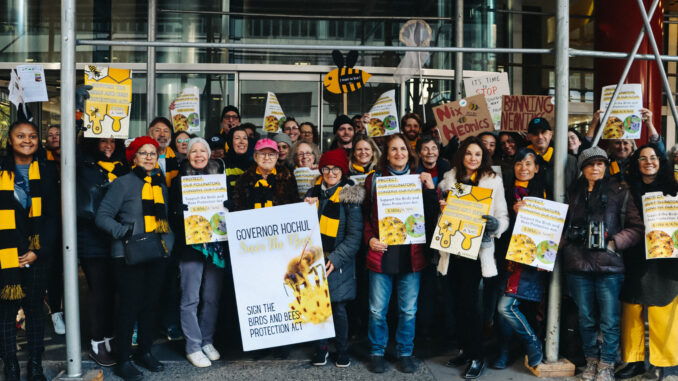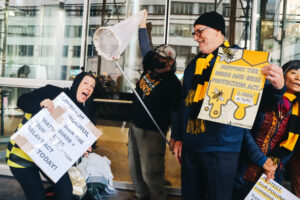
BY TONY LIPKA
Wildlife activists gathered outside Governor Kathy Hochul’s office in Midtown on Wednesday, Nov 16, calling on her to sign a bill that would ban certain crop pesticides. Holding signs and adorned in black and yellow striped scarves, the protestors were there to call attention to agricultural pesticides currently posing a major threat to the state’s biggest pollinators; birds and bees.
The Birds and Bees Protection Act, or Senate Bill 1856A, passed the State Senate in June with bipartisan support. The demonstrators were there to push Hochul to sign it into law.
This bill aims to ban wasteful uses of Neonic, a neurotoxic pesticide predominantly used to coat a plant’s roots or seeds. According to the Natural Resources Defense Council, 95 percent of these pesticides make their way into soil and contaminate it. And while useful for certain crops, the pesticides harm pollinators that other farmers depend on.
Protestors seemed to be in good spirits. Old and young, anyone walking by was invited to join. Clever signs, along with chants such as “Hey hey, ho ho, neonics have got to go,” were used in attempts to spread the word and preserve heat.
Sponsored by Democratic senator Brad Hoylman-Sigal, this bill is now on the Governor’s desk waiting for approval. NRDC Acting Director Dan Raichel is organizing to help it cross the finish line.
“We think our Governor needs to know that this is an important issue to the people of New York. Again, to our food system, to our environment, to New Yorkers’ health, and clean water. And that message needs to be heard loud and clear,” said Raichel, prior to giving a speech in front of Hochul’s office on 41st and 3rd Avenue in Manhattan.
He continued to emphasize the scale at which these pesticides are used throughout the state. “Just one of those seeds right? One corn seed coated in Neonic, has enough active ingredients to kill a quarter million bees or more. Multiply that times 30,000 seeds per acre of corn. Multiply that times over a million acres of corn. With these coatings used statewide, they get in the soil and everything else.”

New York is one of only three states to have over 1,000 organic farms and has historically led the way for progressive agricultural legislation. But like any other bill, the Birds and Bees Protection Act has its detractors.
In July, New York Farm Bureau President David Fisher told the Lockport Union-Son & Journal that the organization shares similar goals with activists and is striving for sustainability. But the Bureau believes this potential ban would lead to further negative results; Increasing tillage, and the use of older, similarly harmful pesticides.
While the two sides disagree on the methods used to get there, they agree on striving for a reduced environmental footprint. For activists passionate about sustainability, and the general public, saving the lives of Birds and Bees is a mission many would consider easy to rally behind.
